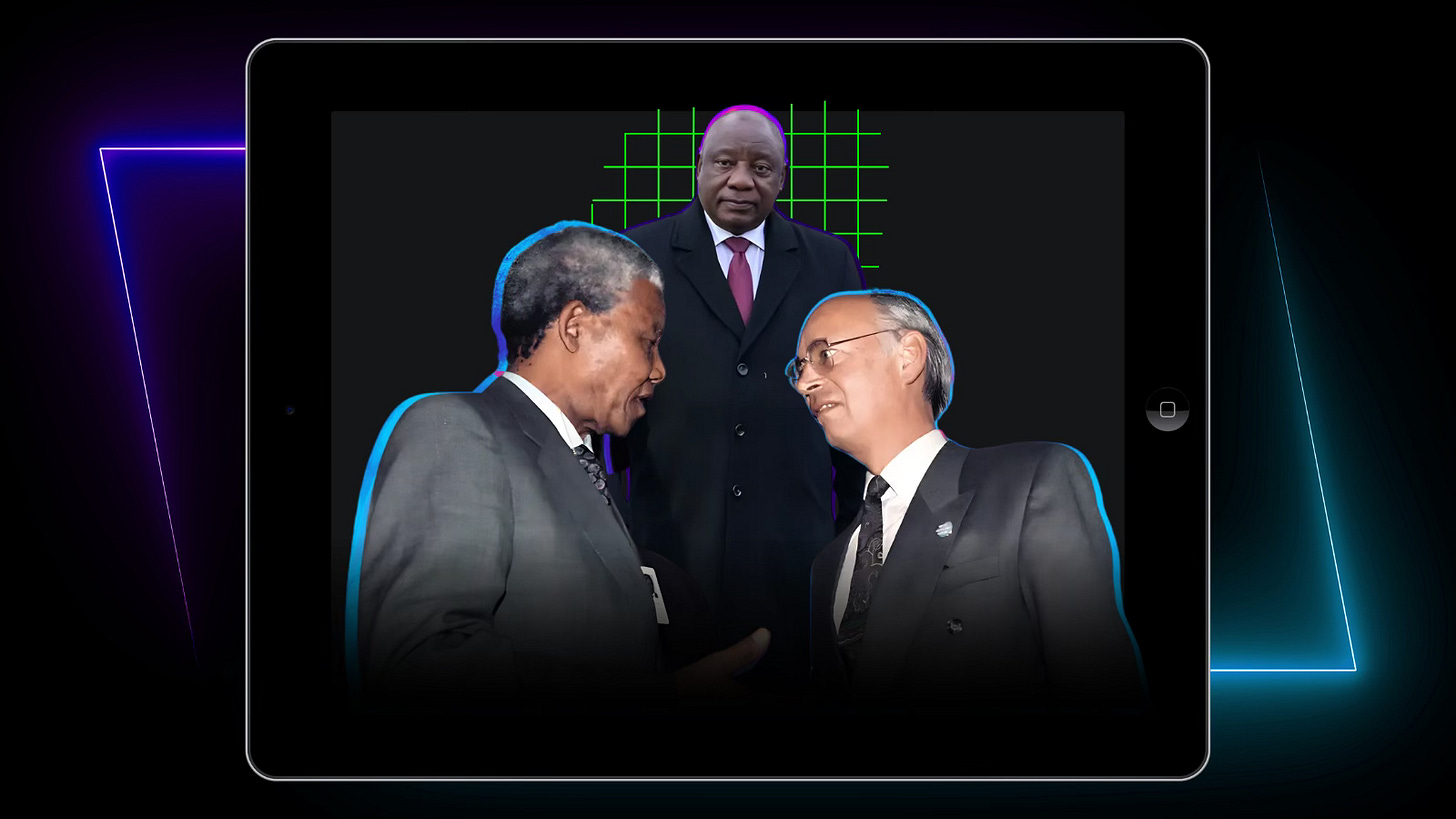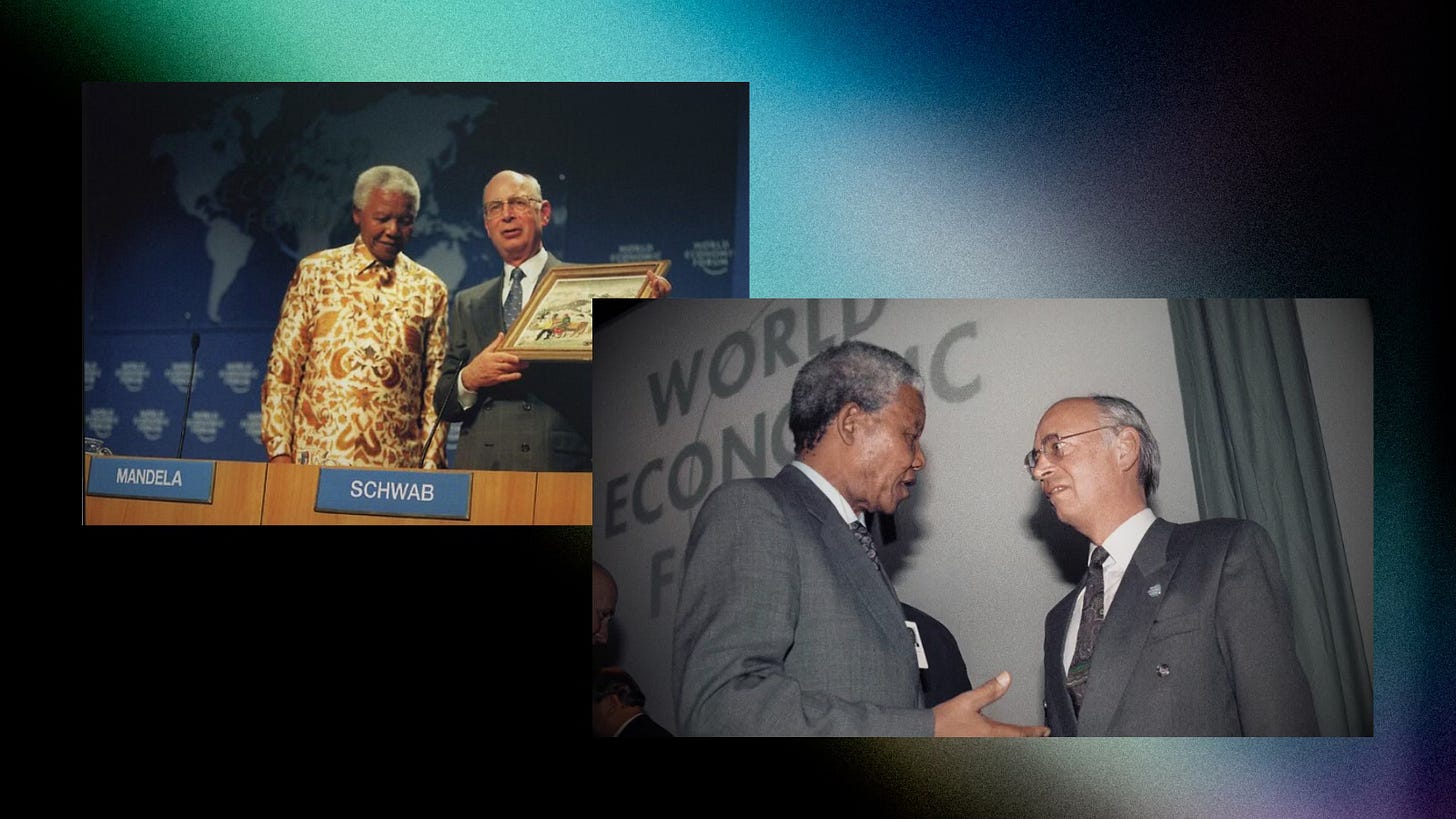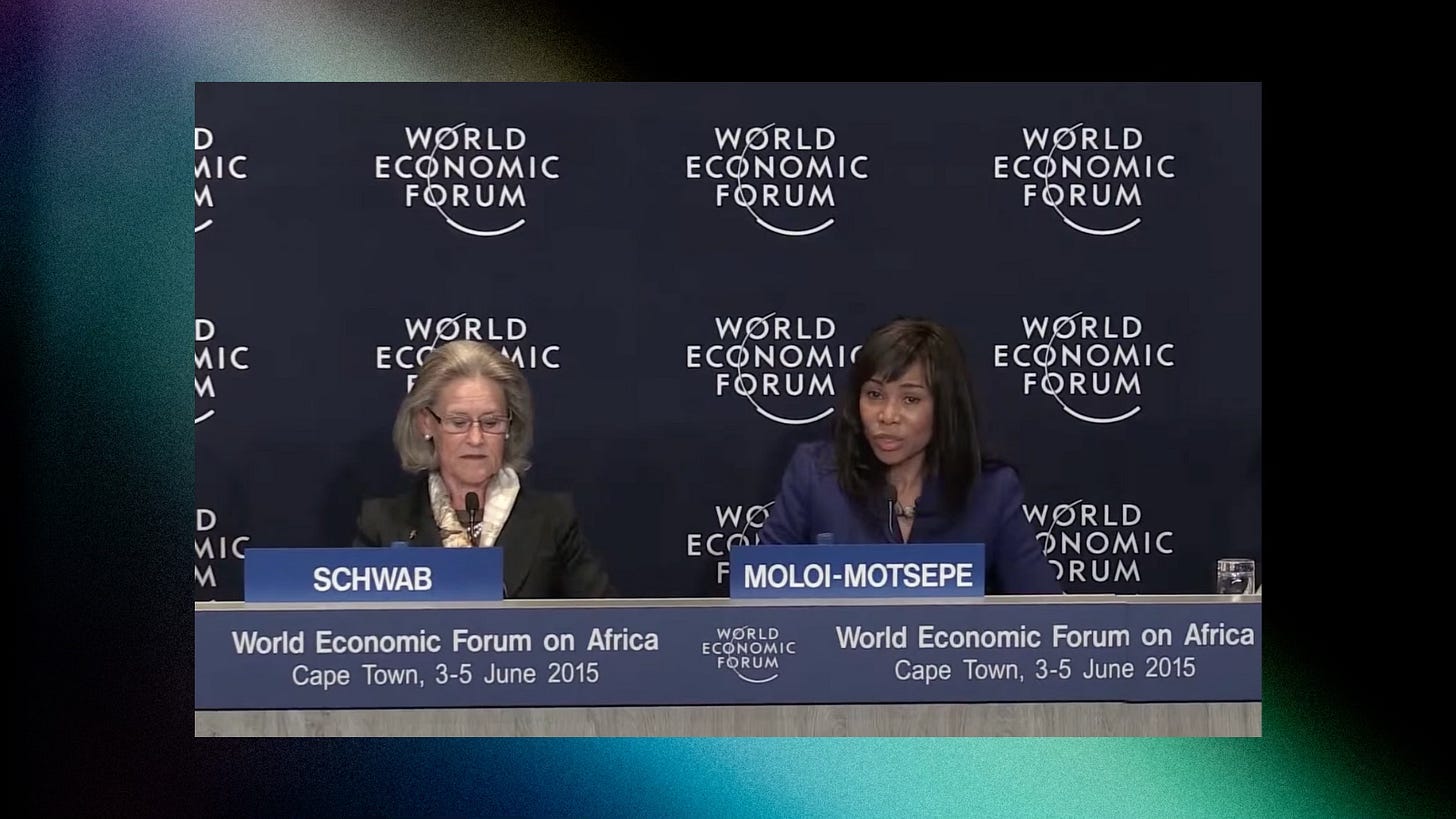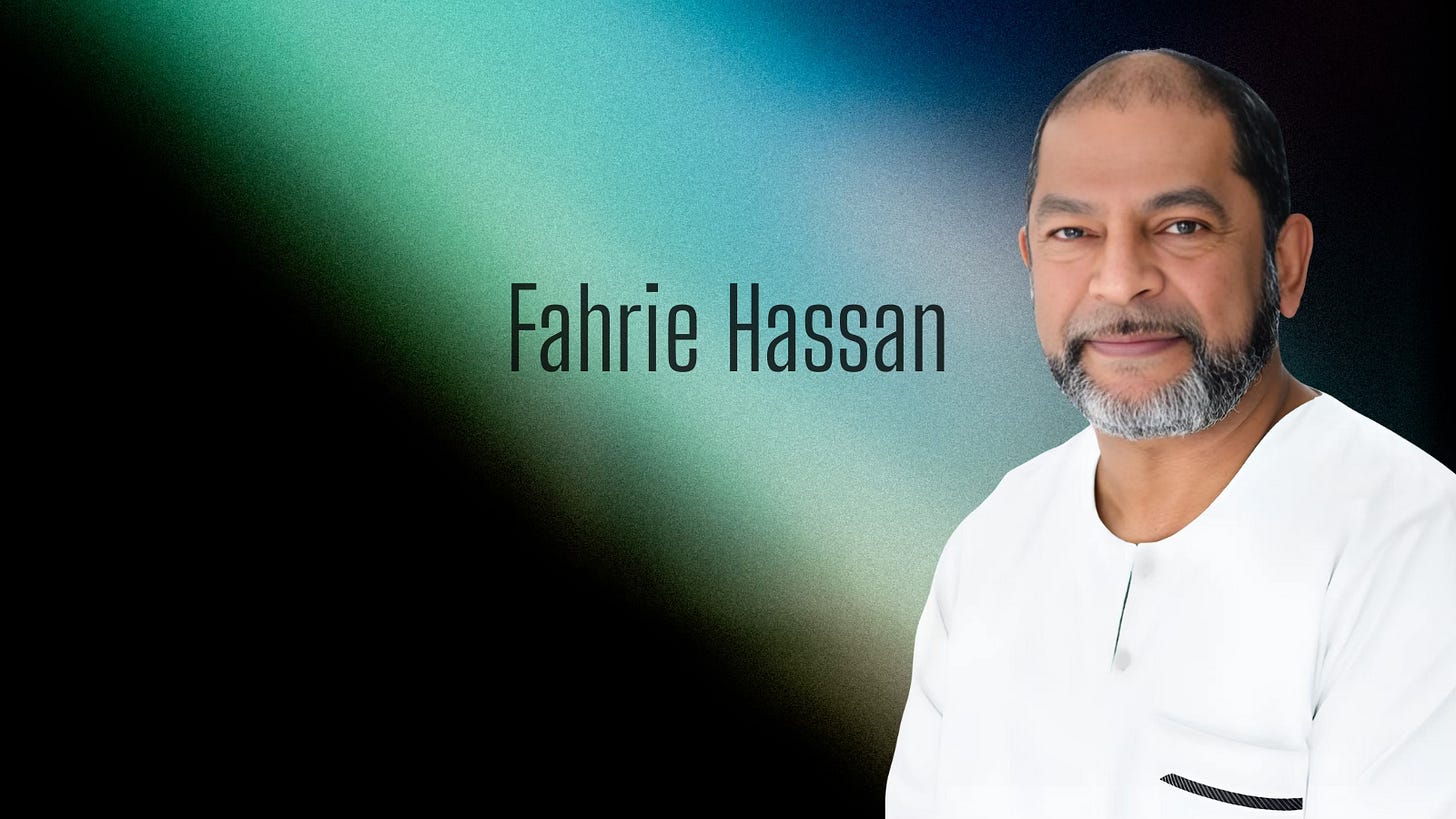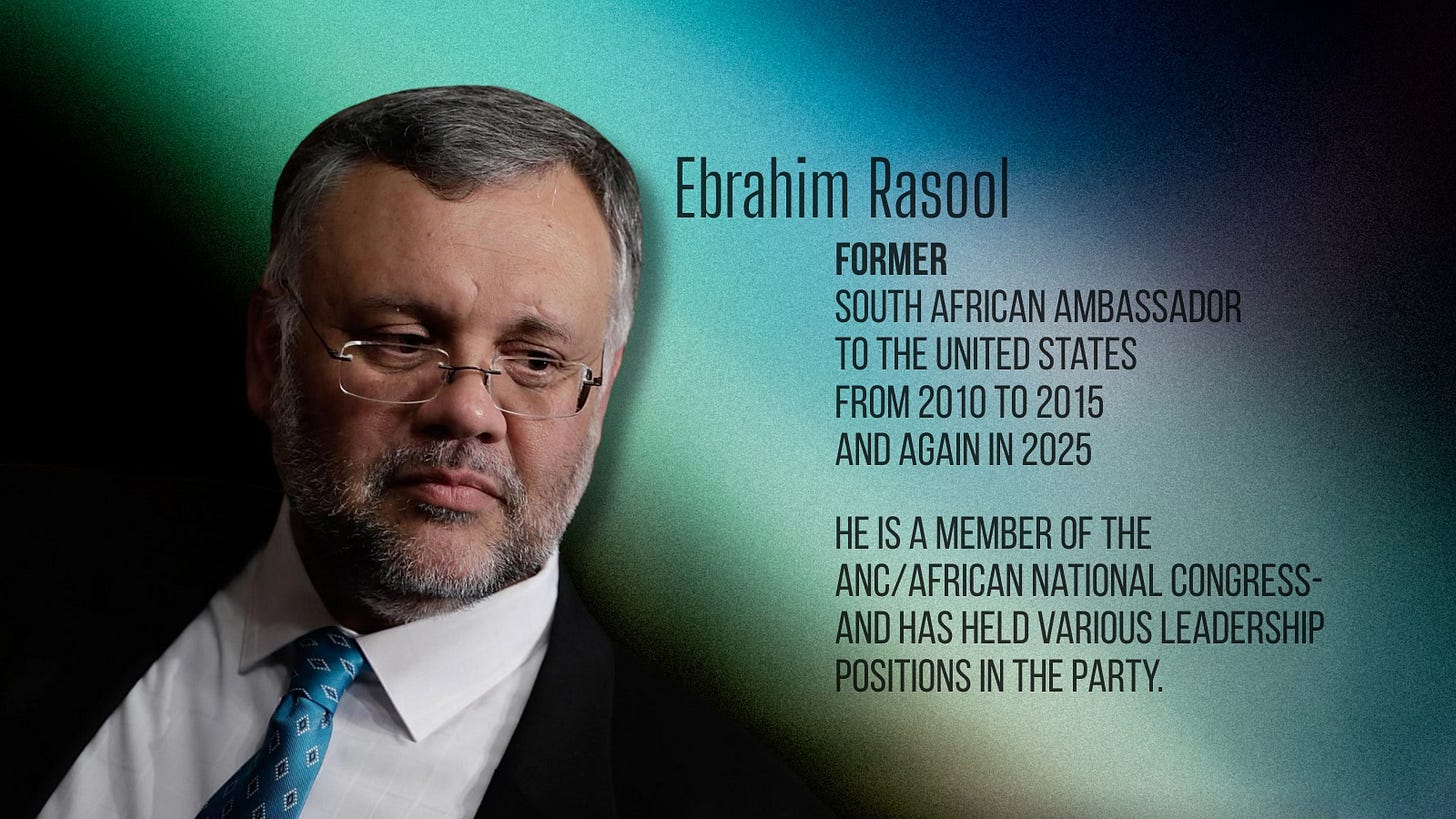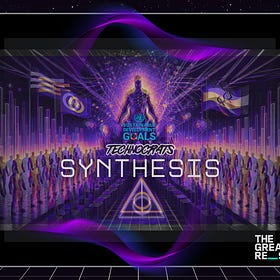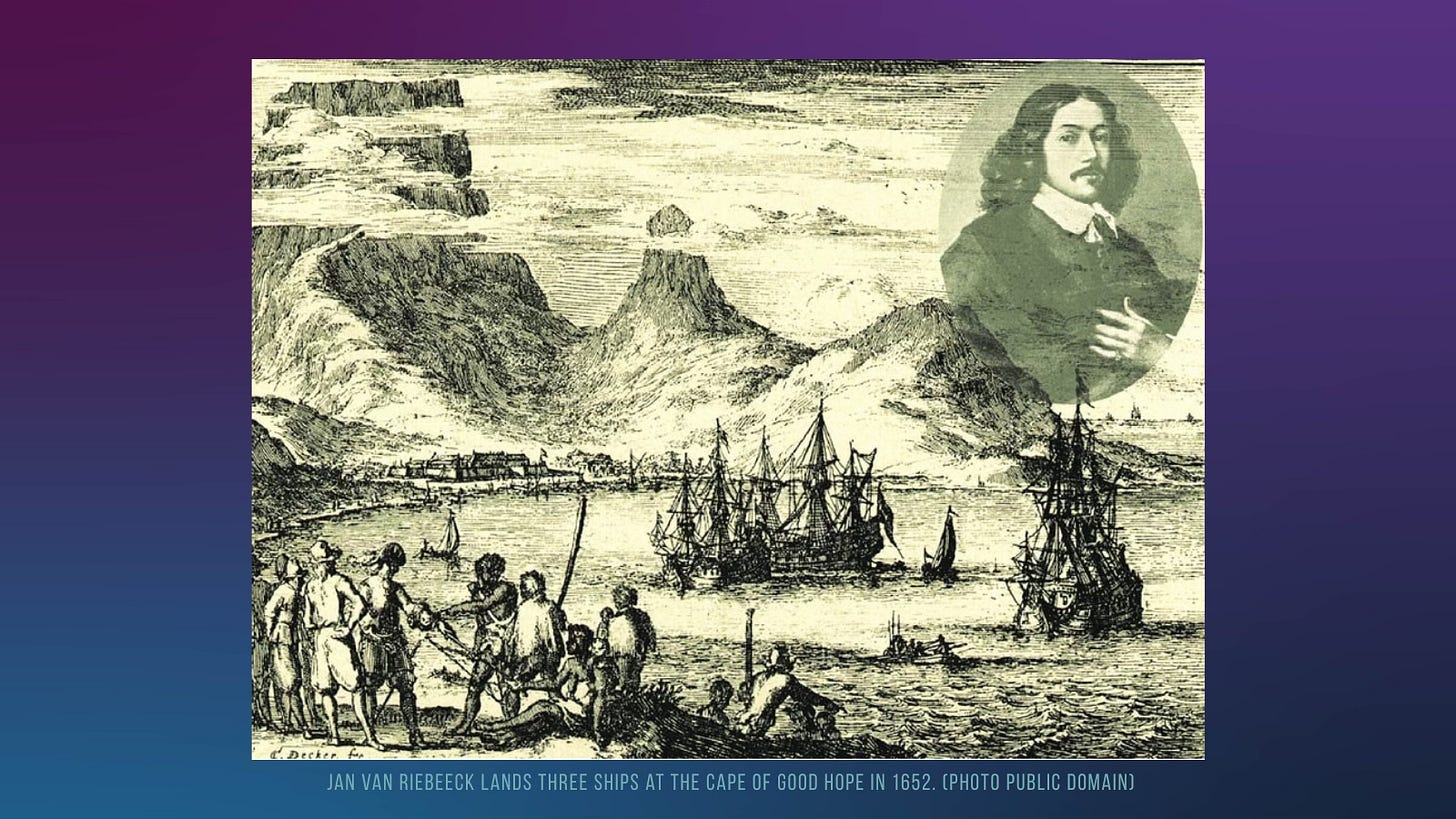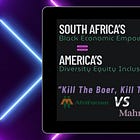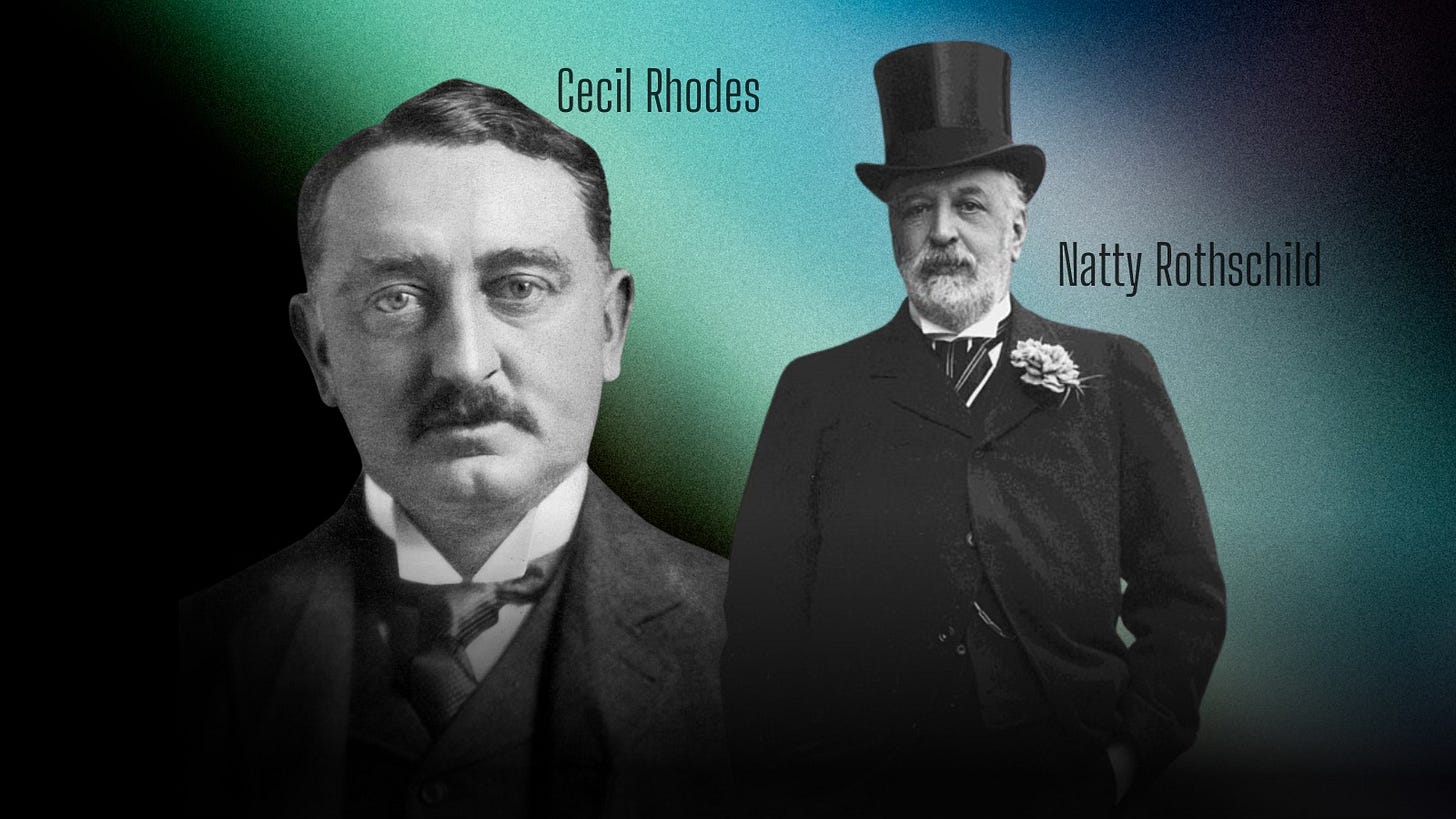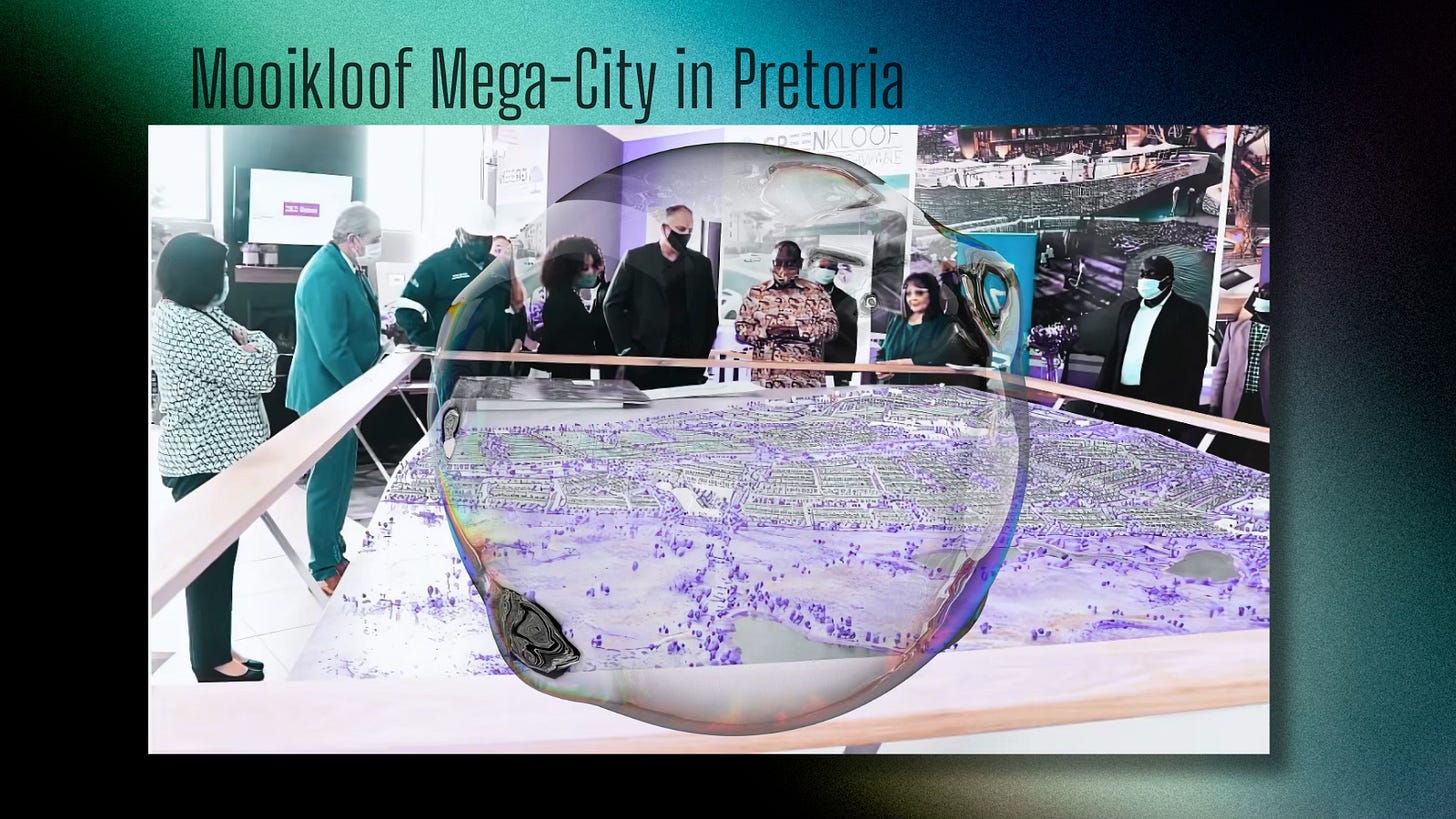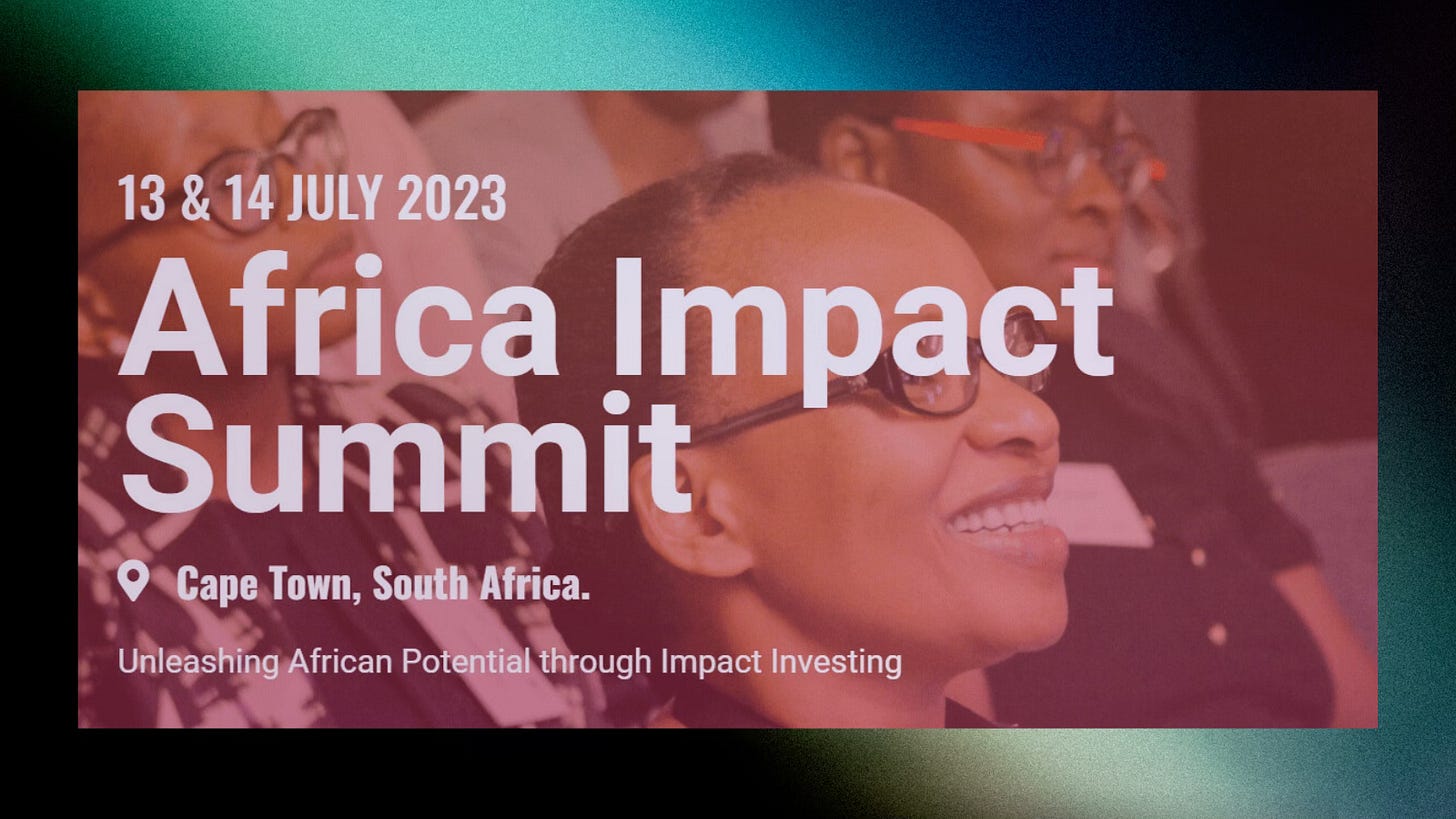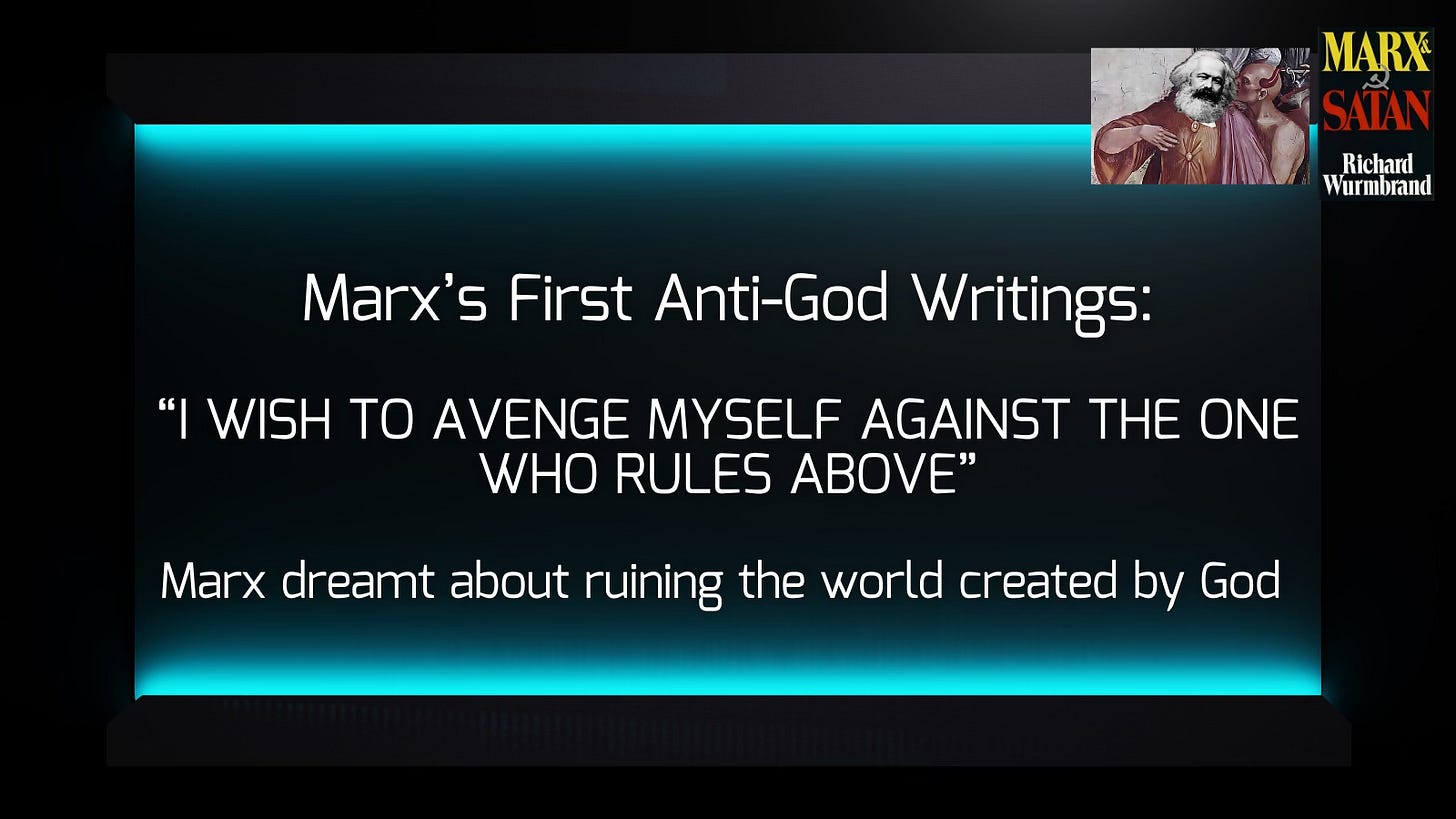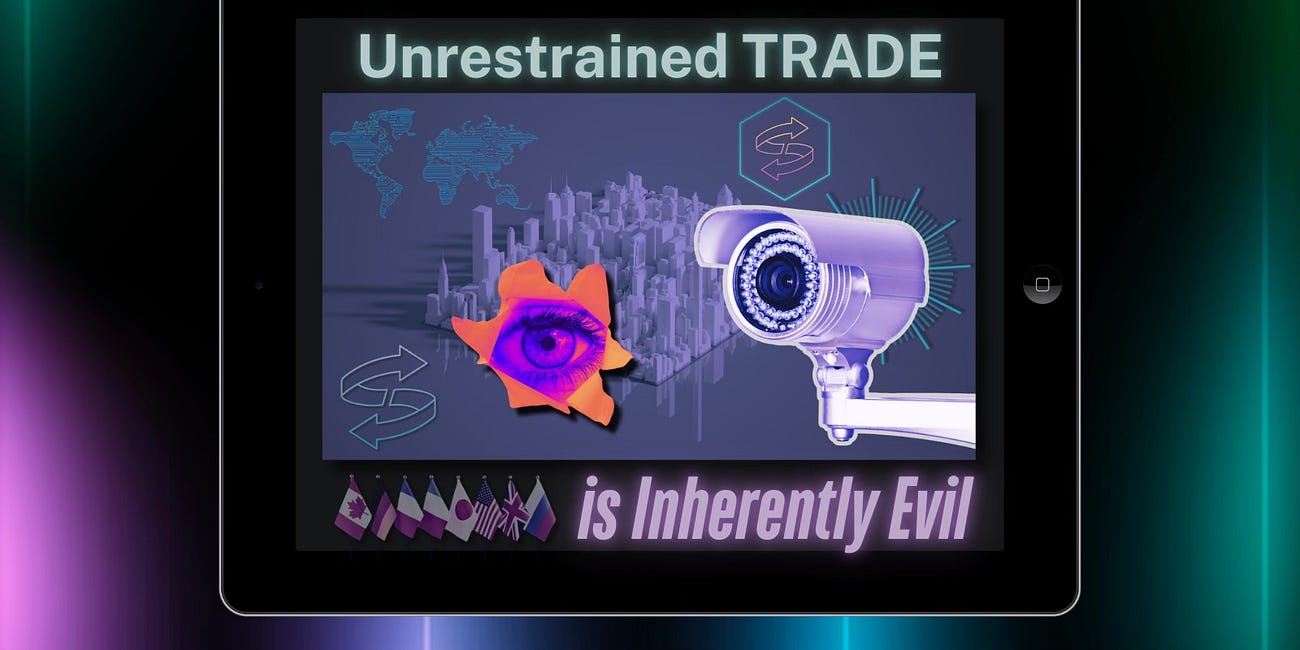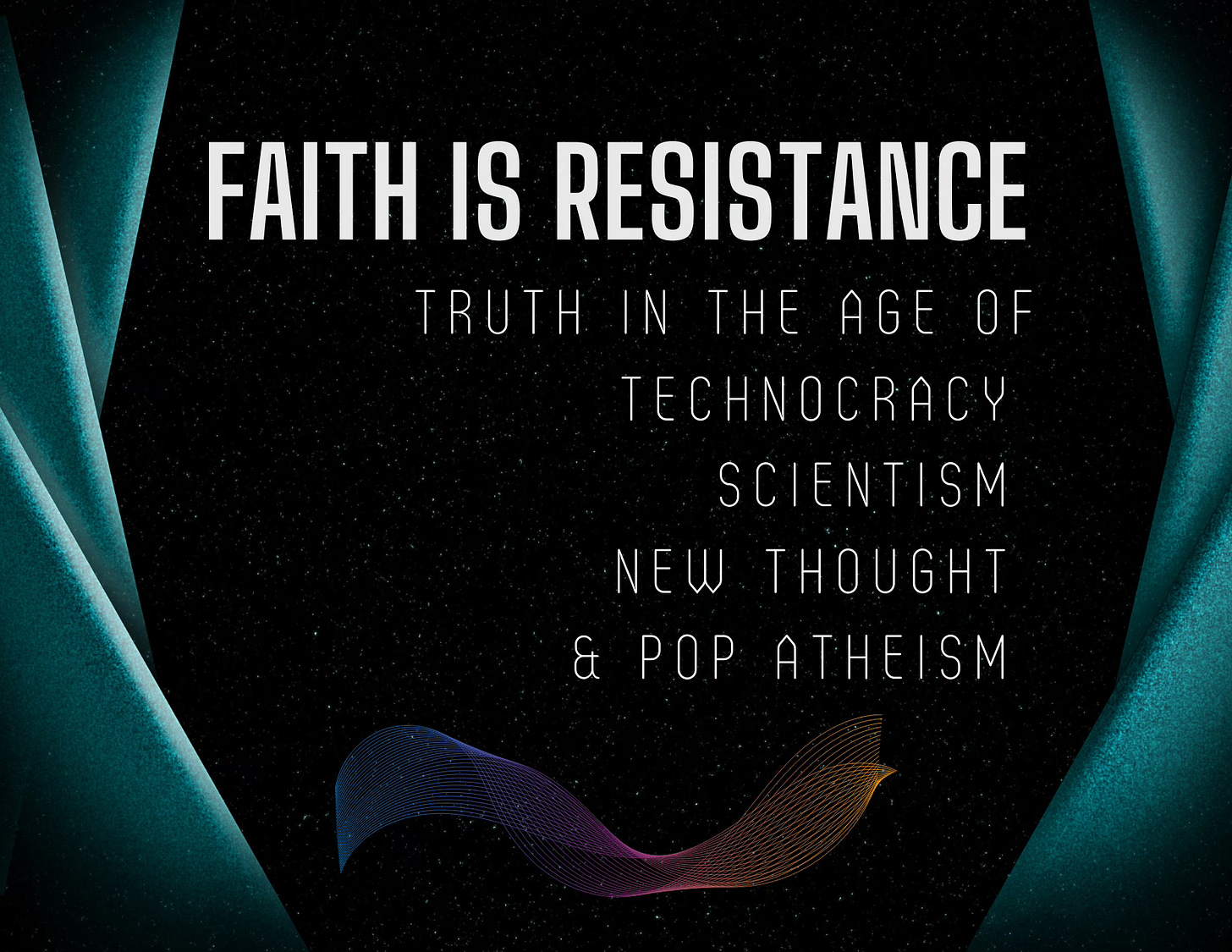In an explosive interview with Invisible Cities (see video below), South African molecular biologist Dr. Fahrie Hassan laid out a detailed case for how South Africa's so-called liberation from apartheid was not what it seemed. Rather than ushering in an era of true independence, the end of apartheid marked the beginning of a new form of capture, one driven not by racial supremacy, but by globalist financial and technocratic elites.
A Pivotal Year: 1994
Two events in 1994 serve as critical clues:
In 1990, Nelson Mandela was released from prison after 27 years, and by 1991 he had assumed leadership over the African National Congress (ANC). This caught the eye of one Klaus Martin Schwab, founder and chief villain of the World Economic Forum. In 1992, Schwab invited the Thembu troublemaker to hob nob with the nosy nobility in Davos and by 1994 Mandela would become President of South Africa. This highly symbolic period marked Mandela’s initiation into the globalist elite’s inner circle, signaled the beginning of South Africa's alignment with globalist technocratic vampires, and the elite’s tacit endorsement of the ANC as their choice to shape South Africa’s future. Celebrated in the media as a historic moment, Schwab’s infiltration and influence from the shadows was a dark portend of South Africa’s capture under the carefully manufactured illusion of liberation.
That same year, Cyril Ramaphosa, now the President of South Africa, was inducted into the WEF's Young Global Leaders program. According to Hassan, this was not coincidental. It was a calculated move to groom a future head of state who would align with WEF agendas.
Together, these moments imply that the succession of power post-apartheid was externally managed. The leadership change was not only a domestic political shift but also an onboarding process into the global technocratic order.
Klaus Schwab and Hilde: The Power Couple
Hassan also points to the growing influence of Hilde Schwab, Klaus Schwab's wife, through the Schwab Foundation for Social Entrepreneurship. This foundation is not just philanthropic window dressing, it actively partners with captured academic institutions like the University of Cape Town, where Precious Moloi-Motsepe serves as Chancellor.
This creates a tightly woven network:
Klaus Schwab shapes the global economic agenda.
Hilde Schwab influences "social impact" initiatives.
Precious Moloi-Motsepe manages academic and policy influence domestically.
Patrice Motsepe (her brother) sits on the WEF Board of Trustees.
This interlocking family-business-political structure reveals how the globalist agenda embeds itself at every level of national influence: political, academic, corporate, and cultural.
A Controlled Transition Masquerading as Freedom
Dr. Hassan's thesis is deeply unsettling because it highlights that South Africa never truly left the control of colonial-style overseers. The flags changed. The names changed. But the real power simply moved from apartheid rulers to a global managerial class using finance, development aid, and health policy as tools of domination.
"They don’t need to invade countries with tanks. They invade through funding, training, and global 'partnerships.'"
This insight shatters the mainstream liberation narrative and forces a difficult question for many: If global technocrats were planning the outcome of South Africa's future as early as 1994, how many other "liberated" nations have undergone the same fate?
Liberation as Theater
Former South African Ambassador to the United States, Ebrahim Rasool, observed for his Marxist rhetoric on South Africa’s "moral leadership," has revealed himself as a loyal actor in the globalist theater. His recent predictable condemnation of Donald Trump, Elon Musk, and J.D. Vance, accusing them of "mobilizing white supremacism" signals the flare to his true handlers: the architects of the Fourth Industrial Revolution (4IR), who seek not to liberate the world, but to digitize, surveil, and enslave it.
Rasool’s removal by U.S. Secretary of State Marco Rubio was more than a diplomatic fallout, it was the 4D chess exposure of a shill whose purpose is to defend the emerging technocratic world order under the guise of anti-racism and global peace. His allegiance is not to the oppressed, but to the system that is building the most sophisticated slavery infrastructure in human history.
There will be no liberation. Only integration—into the final machine.
We are no longer witnessing transitions toward sovereignty. We are witnessing transitions toward total integration into a global governance system, where terms like “freedom,” “equity,” and “justice” are carefully crafted illusions.
Navigating the Age of Narratives
We live in this age of narratives and what we decide to put forth as the dominant story is what we’re going to take for granted as true even if it’s not… the power to set the narrative is the power to define the reality that people live in. -James Lindsay
The Bible says plainly:
“They promise them freedom, while they themselves are slaves of depravity—for ‘people are slaves to whatever has mastered them.’” (2 Peter 2:19)
The moral high ground Rasool refers to is built on sand, not stone. Because true moral authority can only come from alignment with God’s truth, not global consensus, not human rights councils, not Sustainable Development Goals.
What the “Liberation Narrative” Really Does
It neutralizes dissent, by convincing people their struggle succeeded.
It rebrands control as partnership.
It converts resistance into compliance by cloaking it in the language of legacy.
So when the world applauds South Africa for its “moral leadership,” it’s applauding a scripted performance. And the applause distracts the audience from the real set change happening behind the curtain:
The last stage of colonization is to make the people believe they are free.
This is where the words of Ebrahim Rasool come into contrived relief. He once claimed, "South Africa has often been a moral superpower coming out of our struggle for liberation." But as Hassan's evidence shows, that "struggle" has been repackaged and sold to the world as a success story, while behind the scenes, the country is absorbed into a technocratic global system.
In this light, Rasool's statement reads less like a proud proclamation and more like a carefully scripted line in a larger performance.
The liberation narrative is a form of political theater designed to pacify, not to free.
The uncomfortable truth is that there will be no liberation. What we are seeing is the final phase of colonization: digital, financial, and global in scale. A colonization that comes with smiling leaders, social justice slogans, and technocratic tools for control.
And like the Bible reminds us: "You are either a slave to Christ or a slave to sin." There is no such thing as neutral ground. In political terms, the same is true. Nations are not sovereign by default. They are either free under truth, or enslaved under lies.
A Very Brief History of South Africa
South Africa has been in the hands of globalist forces long before apartheid. The idea that Nelson Mandela was a liberator is part of a carefully crafted mythology. In truth, Mandela was a communist and a globalist puppet, used as a symbol to transition South Africa from one form of control to another. The elite's interest in South Africa predates Mandela by centuries.
The story begins when Dutch Calvinist settlers arrived at the Cape of Good Hope. In April 1652, Jan van Riebeeck landed three Dutch East India Company ships Drommedaris, Goede Hoope, and Reijger, at the Cape of Good Hope with 90 settlers, including his wife, Maria de la Quellerie. Tasked with establishing a fortified way station to resupply ships en route to the East Indies, Van Riebeeck laid the foundations for what would become the City of Cape Town. The region was sparsely inhabited by nomadic Khoi and San peoples. For more than a century, the Afrikaners, the descendants of these Dutch settlers built a Christian, Western society before encountering black tribes migrating south.
South Africa developed into a thriving, industrialized, First World nation with nuclear power, a booming economy, and advanced medicine. Despite the injustices of apartheid, there was also cooperation between peoples, the emergence of a black middle class, and migration from neighboring African nations seeking peace and opportunity.
The apartheid policy of “separate development” was intended to mirror the European model of ethnic nation-states and provide self-governance to traditional tribal homelands.
The apartheid policy of “separate development” was intended to mirror the European model of ethnic nation-states and provide self-governance to traditional tribal homelands. The Zulu nation under Chief Mangosuthu Buthelezi supported this model and resisted ANC domination, suffering for it. Still, the Western narrative painted apartheid as pure evil and Mandela’s ANC as the only moral alternative.
But real alternatives to the ANC did exist. The handover to the ANC in 1994 was not a democratic victory, it was a planned transfer of power to a communist front, with the backing of the Soviet Union, the United Nations, the Rockefeller dynasty, and the Council on Foreign Relations. The goal wasn’t racial equality. It was to place South Africa in the custody of the globalist order.
Read how South Africa’s BEE and America’s DEI are two sides of the same ideological coin—tools of engineered division, rooted in neo-Marxist theory, and enforced by supranational influence to dismantle sovereign nations from within.
Rhodes & Rothschild: The Empire Behind the Curtain
Long before Mandela or Ramaphosa, South Africa was targeted by the Rothschild network for its vast natural wealth. The British imperialist Cecil Rhodes, backed by Rothschild money, consolidated the diamond trade into De Beers and expanded gold mining operations across the region. He openly sought to dominate the interior of Africa through strategic conquest.
Rhodes wrote to Natty Rothschild in 1888: “The Matabele king… is the only block to Central Africa as, once we have his territory, the rest is easy…” Within years, British forces slaughtered the Matabele and seized their land.
This colonial conquest built the foundation for today's economic neocolonialism, now masked as "development," "impact investing," and "smart cities."
The Technocratic Takeover Under Ramaphosa
Today, President Cyril Ramaphosa is a high-ranking disciple of Klaus Schwab’s World Economic Forum and a mouthpiece for the Fourth Industrial Revolution (4IR). He speaks of “Africa’s Century,” but his policies deepen dependency on foreign capital and technocratic control.
In 2019, Ramaphosa boasted of a 440% increase in foreign investment, but what he didn’t say is that this came with strings: central bank digital currencies, biometric surveillance, and “smart city” infrastructure.
Projects like the Mooikloof Mega-City in Pretoria are not about local prosperity. These public-private schemes are backed by globalist financiers: The Ford Foundation, Rockefeller Foundation, Soros’ Open Society Foundations, and BNP Paribas—a Rothschild-linked bank. These so-called smart cities are really beta tests for global control mechanisms embedded in the UN’s Sustainable Development Goals.
“Smart cities are the encapsulation of achieving the SDGs, as set out by the United Nations.”
Events like the 2023 Africa Impact Summit in Cape Town, funded by these same players, show us the true face of modern imperialism. This is not liberation. It is digital colonization by a hidden empire.
Final Thoughts
Often called the "Second America," South Africa shares deep historical and spiritual ties with the United States. Both were founded by Christian settlers seeking to escape tyranny and build nations under God’s law. Both fought the British Empire for self-governance.
South Africa was once a thriving, Western, Christian nation—with nuclear power, advanced industry, a rising black middle class, and one of the highest standards of living on the continent. But what we’ve been told about its founding is a lie. The Afrikaners didn’t arrive to oppress; they arrived to build. The land was largely uninhabited when the Dutch landed in 1652. The narrative that portrays white settlers as land thieves and genocidal colonists is a political tool used to justify the dismantling of a nation rooted in biblical truth.
Yes, the elite wanted South Africa's diamonds and gold. But even more than that, they wanted to destroy the possibility of a Christian nation flourishing in obedience to God. Why? Because this isn’t just about power, this is spiritual warfare.
“For we wrestle not against flesh and blood, but against principalities, against powers, against the rulers of the darkness of this world, against spiritual wickedness in high places.” (Ephesians 6:12)
The truth is: these globalists hate God. They hate His order. His beauty. His truth. And above all, they hate His people. Their goal has never been freedom or equality. It has always been capture and destruction of nations, of families, and of souls.
The battle lines are not political. They are spiritual. And South Africa is not just a geopolitical case study, it’s a warning. A preview of what happens when global powers are allowed to write the history, steer the future, and erase God's presence from a nation. Yet even in this, God is not absent, He is sovereign, and His plan for redemption will not be thwarted.
Let this be the hour vast numbers stop believing their lies.
South Africa, as portrayed by Dr. Hassan, is a test case in the broader globalist blueprint:
Use crisis (apartheid, COVID, economic instability) to justify intervention.
Install trusted agents trained in globalist institutions.
Embed influence through philanthropic fronts and academic partnerships.
Capture policy through health, finance, and sustainable development narratives.
This isn't just about South Africa. It's about the world. The Mandela moment at Davos wasn't a handshake of freedom, it was the ceremonial nod of South Africa in submission.
And the public never knew the script was written long before the curtain rose.
They’re not just seizing land, they’re seizing minds. By disguising theft as justice, they’ve convinced millions that land grabs are liberation and progress.
Being Right, Wrongly: How South African Land Stats Are Twisted Into Propaganda
There’s a tactic in modern media that’s as dangerous as outright lying. It’s called: telling the truth falsely and we’ve written about it before.
Fahrie Hassan video:
South Africa exited apartheid to enter "free-fall" into the globalist regime.
Why Tariffs Are an Anti-Globalist Strategy
Trump's tariffs on Canada and Mexico directly challenge the globalist framework outlined in Agenda 21. These globalist plans emphasize regional economic integration, environmental regulations, and the erosion of national sovereignty under the guise of sustainable development.
Unrestrained Trade Is Inherently Evil.
One of the most important duties of a leader is the defense of a nation’s economic independence. The Lord warns against the dangers of unchecked ambition for wealth and self-glorification which always lead to downfall. So far this month we’ve published two articles discussing how tariffs can be used as an economic countermeasure against the globalist co…
Thank you for reading!
Soli Deo Gloria
Summer Black, Director, Armor of Truth
Faith is Resistance!
About Armor of Truth: https://armoroftruth.substack.com/about
Download the Armor of Truth Mobile App Free
NEW! AoT Locals
NEW! AoT Telegram
Join our AoT Newsletter email list
Armor of Truth, Inc is a 501(c)(3) Non Profit Organization
Donations are tax deductible
By supporting Armor of Truth you are helping to reach thousands of people daily with the Gospel of Jesus Christ and encouragement to persevere in a world that is hostile to the gospel. Please consider making a donation to help support this mission.
Support Armor of Truth, official donation page: Donate
Endnotes
World Economic Forum, Young Global Leaders: Community, accessed April 2, 2025, https://www.younggloballeaders.org/community.
South African History Online, “Jan van Riebeeck Arrives at the Cape,” accessed April 2, 2025, https://www.sahistory.org.za/dated-event/jan-van-riebeeck-arrives-cape.
Niall Ferguson, The House of Rothschild: The World's Banker, 1849–1999 (New York: Penguin Press, 1999).
United Nations, Smart Cities and Infrastructure, UN Department of Economic and Social Affairs, accessed April 2, 2025, https://sdgs.un.org/topics/smart-cities.
Republic of South Africa, Department of Communications, Report of the Presidential Commission on the Fourth Industrial Revolution, 2020, https://www.gov.za/sites/default/files/gcis_document/202010/4ir-commission-report.pdf.
World Economic Forum, Shaping the Future of the Fourth Industrial Revolution, accessed April 2, 2025, https://www.weforum.org/platforms/shaping-the-future-of-the-fourth-industrial-revolution.
Paola Amaldi, “Invisible Cities: Dr. Fahrie Hassan on South Africa’s Capture by Global Elites,” Invisible Cities Podcast, original transcript, 2024. [Transcript provided by user.]
Leonard Thompson, A History of South Africa, 3rd ed. (New Haven: Yale University Press, 2000).
Schwab Foundation for Social Entrepreneurship, About Us, accessed April 2, 2025, https://www.schwabfound.org
South African Communist Party, Our History: Relationship with the ANC, accessed April 2, 2025, https://www.sacp.org.za
In This Article
Mandela at Davos · Klaus Schwab in South Africa · Cyril Ramaphosa and the WEF · BRICS and globalist capture · Fourth Industrial Revolution (4IR) in Africa · Smart cities and technocracy · ANC and SACP alignment · Rothschild and Rhodes influence · Cape Town impact summit · Global governance through SDGs · Christian heritage of South Africa · Erasure of God’s order by global elites





